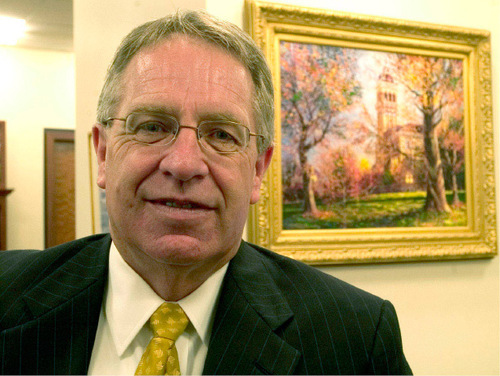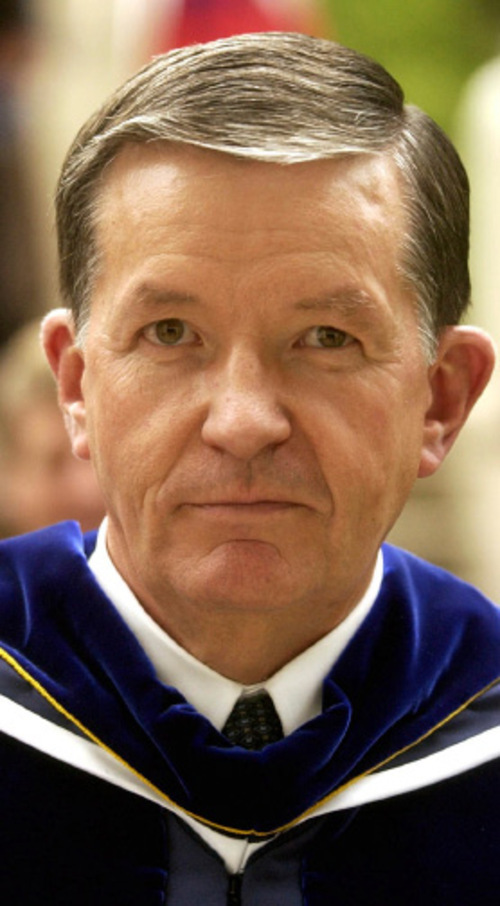This is an archived article that was published on sltrib.com in 2010, and information in the article may be outdated. It is provided only for personal research purposes and may not be reprinted.
"Stan," Nevada president Milton Glick wrote in an e-mail to Utah State president Stan Albrecht the morning of Tuesday, Aug. 17, "some time when you are bored, give me a call."
Glick presumably wanted to chat with Albrecht about "The Project," the code name given to the Western Athletic Conference's since-scuttled plan to add Brigham Young University's non-football sports teams and finalize a series of football games for WAC teams against the Cougars beginning in 2011, when they would be an independent in that sport.
Besides showing how The Project was engineered and almost finalized, e-mails exchanged between presidents of universities, obtained Thursday by The Salt Lake Tribune in an open records request to Utah State University, show the presidents have the real power when it comes to negotiations regarding athletics, not athletic directors.
But the messages also show that the college presidents operate in an intimate, oft-times chummy atmosphere in which everybody's on a first-name basis and huge decisions are made with a quick phone call or signature.
The string of messages illustrate, too, how personal WAC presidents took the departure in June of WAC member Boise State to the Mountain West Conference — although publicly, the move was met with congratulatory news releases and well wishes. It's probably safe to assume, then, the same thing is going on among presidents of MWC schools as flagship member BYU weighs a move that is perceived as even more of a betrayal, seeing as how the Cougars are not making a move upward to a more prestigious conference.
Business is all about relationships, and apparently, so is college athletics at the highest levels.
Forget the presidential stuff and the formal titles. When presidents of universities exchange greetings, they're no different than anyone else.
"Karl [Benson], if you get to a place where you have cell service, give me a call," wrote USU's Albrecht to WAC commissioner Karl Benson. "I just completed a most interesting conversation with [BYU president Cecil] Samuelson that I need to visit with you about."
They also work at home, it appears.
This from Benson to school presidents in an e-mail sent at 10:33 p.m. the night of Aug. 16: "Well.....an interesting day to say the least."
It is interesting to note in the now famous e-mail from Albrecht to a USU attorney about how Boise State president Bob Kustra's "world is crumbling" that Albrecht refers to the potential of Fresno State and Nevada of paying the buyout clause this way: "I don't think either John or Milt has $5 million to buy their way out."
Clearly, the e-mails show that Albrecht was a driving force behind The Project, which, had it not collapsed, would have put Utah State in the same conference as the USU president's former employer, BYU.
Albrecht was at BYU from 1974-92, including three years as academic vice president and associate provost.
"I basically told [Kustra] that they were more than a day late and a dollar short.....they have clearly been caught unprepared for us," Albrecht wrote to Fresno State president John Welty on Aug. 17. Albrecht was referring to a phone call he believed Kustra was going to make to Welty, inviting Fresno State to the Mountain West.
For his part, BYU athletic director Tom Holmoe knows that the presidents hold the power.
"Who do you think makes the decisions in these cases?" Holmoe asked reporters last July in an informal meeting to discuss the future of BYU athletics. "The ADs, or the board of directors and the presidents and the board of directors of the schools? The ADs don't make the decisions. Hopefully, and in our case [it is true], we are consultants."





